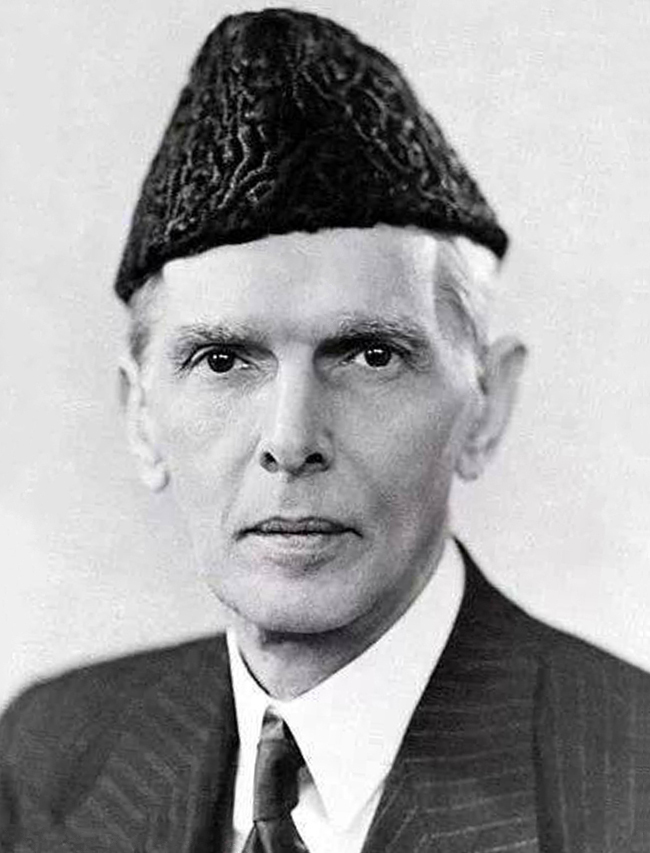
The year 1905 is also significant in India’s political history. Mr, Muhammad Ali Jinnah started his political career as a young secretary of a distinguished Parsi leader of the All India Congress Party, Sir Dadabhoy Naroji, This was the year when the Viceroy of India, Lord Curzon, announced the partition of the province of Bengal which had grown into an unmanageable administrative unit. The division of Bengal was violently opposed by the Hindu community because it endangered their political and economic vested interests as the Muslim peasantry of eastern districts of Bengal had for long contributed to the prosperity of Hindu businessmen and money lenders of Calcutta, Though the division of Bengal was annulled in 1911 by the British government under pressure from the All India Congress Party, it was the first clear sign that the political and economic interests of Hindus and Muslims were diametrically opposed and that the majority Hindu community was not prepared to concede even the most legitimate rights of the minority Muslim community. The Muslims who had, by and large, cooperated with the Hindus for a common cause of independence of a united India, were rudely shaken and disillusioned. The Two Nation theory thus became a political reality in India and the division of Bengal in 1905 served as the introductory chapter of the Partition of the subcontinent in 1947.
From 1906 to 1947, India passed through various stages of constitutional development leading the country ultimately to full independence, The Hindus had demanded a united India in which they would enjoy a 4 to 1 majority over the Muslims and thus hold power under a western-oriented political system. For the British, a united India was a geopolitical concept dear to their heart. For the administrative convenience and security of the Raj, they had devised a strong central government with a single army and unified superior services. The Muslims, on the other hand, had neither a common objective nor a united platform. The first attempt to organise them was in 1906 when the All India Muslim League was formed in Dacca. The same year, a delegation of Muslim leaders, led by His Highness the Aga Khan, called on the Viceroy of India, Lord Minto, and put forward the demand for separate voting rights for the Muslims. In the beginning, the attempts by the Muslim League to unite and organise Indian Muslims met with limited success only. It was not until the late nineteen-thirties that the Muslims, under the leadership of Mr. Muhammad Ali Jinnah, started organising themselves as an effective political force in anticipation of the in- dependence of India which had become inevitable as a consequence of the Second World War.
The Role of Hazrat Khalifatul Masih II
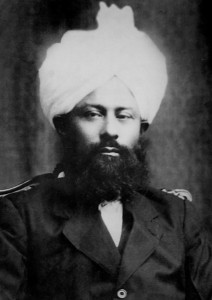
(1889-1965)
In their struggle for recognition as a separate entity and the fight to secure their legitimate rights, the Indian Muslims and the Muslim League had the unqualified support of the Ahmadiyya community. In 1914 Hazrat Mirza Bashiruddin Mahmud Ahmad became the Second Successor of the Promised Messiah. Apart from being blessed with great spiritual qualities, he possessed extraordinary political acumen and a separate discourse will be required to outline his services towards the political and social emancipation of Indian Muslims, He did not join any political party but his wise counsel was sought by Muslim leaders on critical occasions. He either wrote himself or caused to be written many books and articles on the important issues confronting the country and providing necessary guidance to Indian Muslims. In 1922-23, he successfully and singlehandedly fought against a campaign by the Arya Samaj to convert the Muslim Rajputs ‘called Malkanas’ in the United Provinces of India, The members of the Ahmadiyya community responded to his appeal and served as volunteers to prevent the mass apostasy of poor and frustrated Malkana Muslims. In 1924, he was invited to visit London for participating in the Commonwealth Conference of Living Religions. Apart from introducing true Islam to the people of the West, he made them conscious of the separate entity of Muslims in India. In 1928, he wrote “Muslim Rights and the Nehru Report”, exposing the serious danger to the Muslims from the constitutional plan devised by a committee of the All India Congress Party under the leadership of Pandit Moti Lal Nehru, father of Jawahar Lal Nehru, A little earlier, one of the most distinguished Indian Muslim leaders, Maulana Muhammad Ali Jauhar, had paid tribute to the Head of the Ahmadiyyah Community in these words “It will be ungrateful if we do not mention Mirza Bashiruddin Mahmud Ahmad and his well disciplined community who have devoted all their efforts, irrespective of doctrinal differences, towards the welfare of the Muslims, These gentlemen arc, on the one hand, taking active interest in the politics of Muslims and, on the other, energetically engaged in promoting the unity, organisation, trade and preaching among Muslims, Time is not far away when the attitude of this organised sect of Islam will provided guidance for the Muslim nation in general and for those persons in particular who are idly sitting under the domes of Bismillah and making boastful and empty claims of service to Islam.” (Hamdard, 26 September, 1927).
The Round Table Conference
Hazrat Mirza Bashiruddin Mahmud Ahmad, Khalifatul Masih II, wrote another important book entitled “A solution of the present political problem of India” on the eve of the First Round Table Conference held in London in November 1930. Our respected leader, Sir Chaudhry Muhammad Zafrullah Khan, represented Indian Muslims in this conference as well as in the following conferences in 1931 and 1932, along with other important leaders such as Mr. Muhammad Ali Jinnah, His Highness the Aga Khan and Dr. Sir Muhammad Iqbal. In his recently published book “Servant of God” Sir Chaudhry Muhammad Zafrullah Khan has repeatedly acknowledged the debt that he owed to Khalifatul Masih II for the inspiration and guidance which enabled him to play an important part not only in the three Round Table Conferences but in the subsequent negotiations leading to India’s independence. In 1931, Chaudhry Sahib was elected as President of the All India Muslim League and presided over its annual session in New Delhi.
Formation of all India Kashmir Committee
Even a brief account of the invaluable contribution of Hazrat Mira Bashiruddin Mahmud Ahmad in helping Indian Muslims to identify their problems and to plan strategies for achieving their objectives, will not be complete without mentioning two important services rendered by him. In 1931, at his initiative, the All India Kashmir Committee was established to help the Muslims of that State secure fundamental human and political rights from an autocratic Maharaja. He was elected as the first President of this Committee which included among others Dr. Sir Muhammad Iqbal. The time, effort and resources provided by Khalifatul Masih II until the end of his life, for the Muslims of the State of Jammu and Kashmir, have been recorded and duly acknowledged by the Kashmiri leaders including the late Sheikh Muhammad Abdullah.
Muhammad Ali Jinnah returns to Pakistan
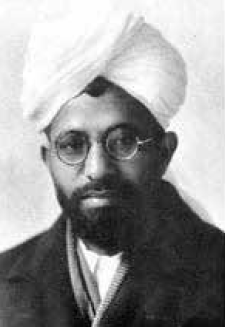
(1894-1955)
The second important development which had a lasting impact on the political scene in India was the personal intervention of Hazrat Mira Bashiruddin Mahmud Ahmad in persuading Quaid-e-Azam Muhammad Ali Jinnah to return to India and resume leadership of the Indian Muslims at a critical time when their future was in jeopardy, Disgusted and dismayed at the intransigence of the Hindu leaders and the lack of unity amongst the Muslims, Mr. Jinnah decided to settle down in London after the Third Round Table Conference in 1932. How he was persuaded to return to India is described in the book “Ahmadi Muslims A Historical Outline” by Mr. Nuruddin Munir published by Lajna Imaillah Rabwah.
“Hazrat Khalifatul Masih was distressed at the turn of events. He knew that it was Mr. Jinnah who could guide and lead the Muslims of India, There was no other leader with the political sagacity and iron nerves required to secure for Indian Muslims a decent political future. He felt that if Mr. Jinnah would not come back the Muslim cause would be lost. So he deputed Mr. Dard, Ahmadiyyah Missionary in London, to see Mr. Jinnah and persuade him to come back to India for taking up the case of the Indian Muslims. Mr. Dard had many interviews with Mr. Jinnah. Eventually, Mr. Jinnah changed his mind and agreed to return to India and resume the political struggle for Indian Muslims. The start was made in London. Mr. Dard arranged a meeting on the lawns of the London Mosque. Some 200 politicians and intellectuals attended. Those included Mr. Pethick Lawrence, Sir Edward McLagen, Professor H.A.R. Gibb, Sir Denison Ross. Sir Nairne Stewart Sandeman presided. Mr. Jinnah spoke on ‘India of the Future’ He started his talk with the announcement that Mr, Dard’s persuasion had compelled him to come again into the political field, from which he had withdrawn, ‘The eloquent persuasion of the Imam left me no escape.’
“The speech was extensively reported in the press. The Sunday Times, London, in its issue of April 9, 1933, wrote:
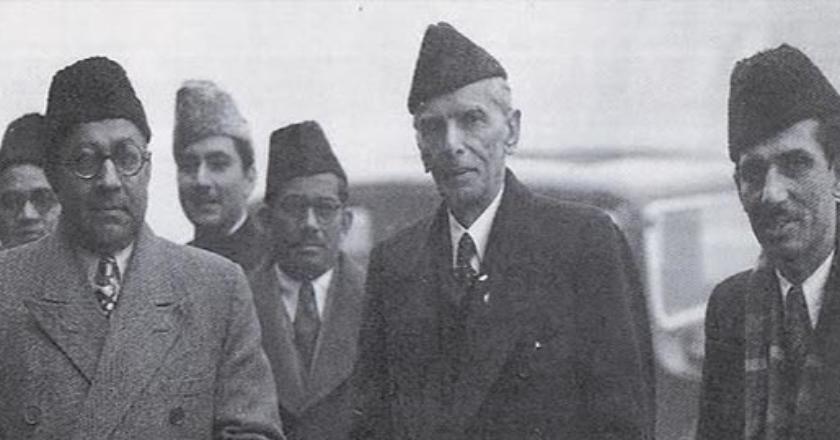
“There was also a large gathering in the grounds of the Mosque in the Melrose Road, Wimbledon, where Mr. Jinnah, the famous Indian Muslim, spoke on India’s future. Mr. Jinnah made unfavourable comments on the Indian White Paper from a national point of view, The Chairman, Sir N, Steward Sandeman, M.P, took up the Churchill attitude on the subject and this led to heckling by some of the Muslim students, who were, however, eventually calmed by the imam of the mosque,”
In case anyone objected that this account came from an Ahmadi source, let me refer to a non-Ahmadi writer whose credibility is beyond any doubt. Writing in a special supplement of the Pakistan Time on 11 September 1981, the well-known, journalist, Mian Muhammad Shafi, recorded the following:
“So disgusted was Mr. Jinnah with washing of the dirty linen of Indian politics in public by the leaders of Indian public opinion that he decided to retire from Indian politics and in token thereof took his abode in London – almost permanently. It was Mr. Liaquat Ali Khan and Maulana Abdur Rahim Dard an Imam of London Mosque, who persuaded Mr, M.A, Jinnah to change his mind and return home to play his role in national politics, Consequently, Mr. Jinnah returned to India in 1934 and was elected to the Central Assembly, un-opposed.”
Support for the All India Muslim League
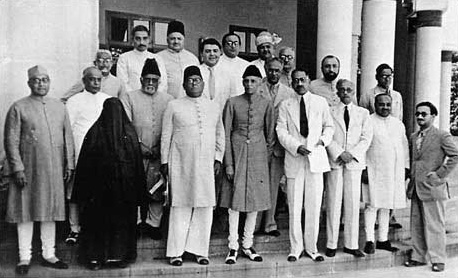
So, Mr. Jinnah returned to India and resumed the political struggle on behalf of Indian Muslims. At its historic session in Lahore in 1940, the All India Muslim League demanded a separate homeland for one hundred million Muslims in India where they could order their lives in accord with Islam, This was the famous Pakistan resolution. Despite strong opposition from the Congress as well as the British government, this demand was eventually met and Pakistan came into existence as an independent and sovereign state on 14th August 1947. Once again, the Ahmadiyyah Community under the guidance of Hazrat Khalifatul Mash I played an active role in the process leading to the establishment of Pakistan, In the elections of 1946, he advised not only the members of the Ahmadiyyah Community but also all other Muslims to rally round the leadership of the All India Muslim League and to support the demand for Pakistan on which those elections were fought, It is significant to note that even among Muslim political and religious groups and leaders, there were some who violently opposed the creation of Pakistan and criticised Quaid-e-Azam Muhammad Ali Jinnah, and the same factions and people have been the enemies of Ahmadiyyat and its Founder, It is a paradox that some of these are now claiming to be the champions of Islam and the guardians of Pakistan.
The Boundary Commission & Partition of India
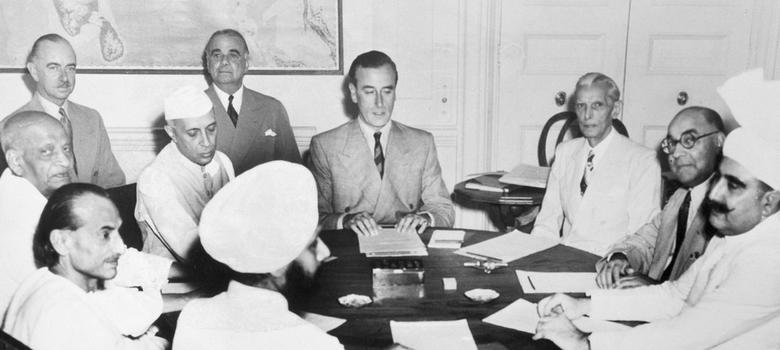
A tragic consequence of the Partition of India was the partition of the province of Punjab. For this purpose, a Boundary Commission was set up under a British judge, Sir Cyril Radcliffe. Sir Chaudhry Muhammad Zafrullah Khan was nominated by the Quaid-e-Azam to represent the Muslims of Punjab before that Commission. Hazrat Khalifatul Masih II worked day and night assisting Chaudhry Sahib’s effort to put up an irrefutable case on behalf of the Muslims. At his expense, he secured important documents and also the services of an expert from London – Professor Speight of London School of Economics-who gave useful advice on geopolitical aspects of the boundary line. However, the Radcliffe Award was based not on the merits of the case but on the political expediency of the Viceroy and Governor-General, Lord Louis Mountbatten who was instrumental in yielding the Muslim majority district of Gurdaspur to India which provided India an-access to the State of Jammu and Kashmir, Apart from creating the Kashmir dispute as a continuing source of friction between India and Pakistan, the unjust Award left Qadian on the Indian side of the border and compelled the Imam of the Ahmadiyyah community to migrate to Pakistan and establish a new centre at Rabwah. This eventuality was foreseen by the Promised Messiah who had predicted in 1902, in his publication in these terms: “The Christian people will commit fraud to torment us…. those will be the days of trial… And you should say ‘O God give me a place in پاک زمین (pure land) which will be a sort of spiritual migration.”
Later, some avowed opponents of Ahmadiyyat criticised the role of Sir Chaudhry Zafrullah Khan as an advocate of Muslims before the Punjab Boundary Commission. An unequivocal rebuttal came from Justice Mr. Muhammad Munir who was a member of that Boundary Commission and who later presided over the Commission of Inquiry into anti-Ahmadi disturbances in 1953 and wrote this in his famous report:
“Vile and unfounded charges have been levelled against the Ahmadis that the district of Gurdaspur was assigned to India by the Award of the Boundary Commission because of the attitude adopted by the Ahmadis and the arguments addressed by Chaudhri Zafrullah Khan who had been selected by the Quaid-e-Azam to present the case of the Muslim League before that Commission. But the President of the Court, who was a member of that Commission considers it his duty to record his gratitude to Chaudhri Zafrullah Khan for the valiant fight he put up for Gurdaspur, This is apparent from the record of the Boundary Commission which anyone who is interested may see. For the selfless services rendered by him to the Muslim community, it is shameless ingratitude for anyone to refer to Chaudhri Zafrullah Khan in the manner in which he has been referred to by certain parties before the Court of Inquiry.” (Page 197)
Sir Zafrullah Khan appointed the first Foreign Minister
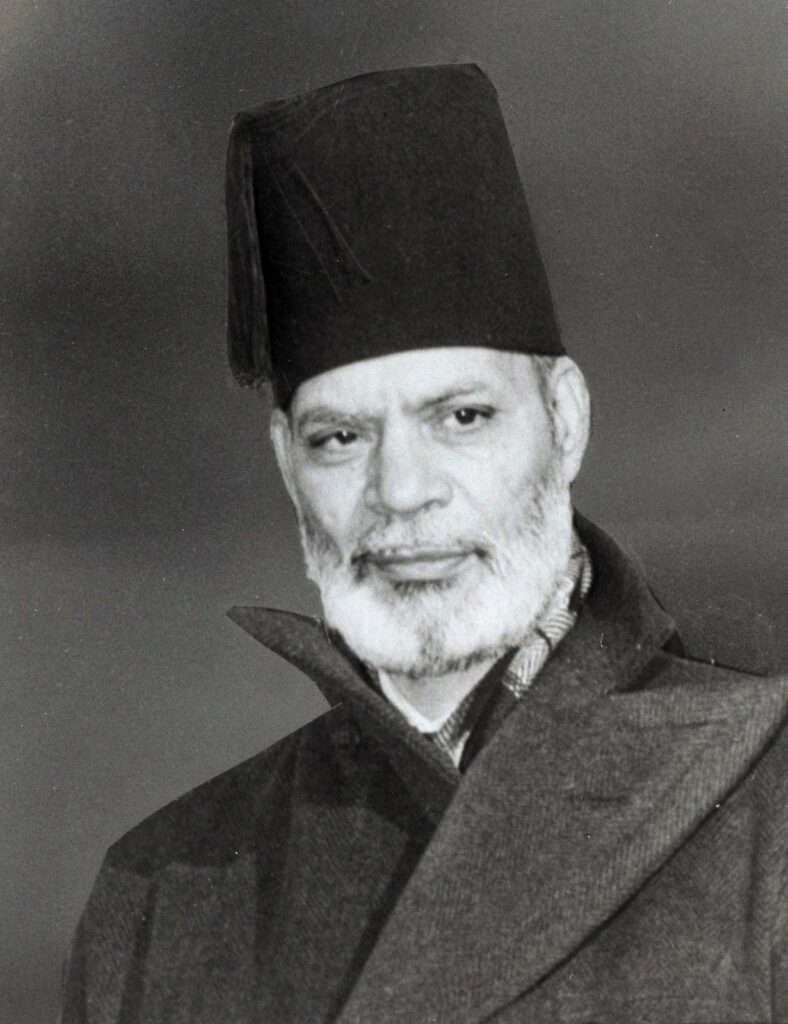
The Quaid-e-Azam was so pleased with the performance and services of Sir Chaudhry Muhammad Zafrullah Khan that he immediately nominated him to lead Pakistan’s first delegation to the United Nations in 1947 and soon afterwards appointed him as the first Foreign Minister of Pakistan.
The Partition of the country was accompanied by an unparalleled holocaust of death and destruction in many parts of India. Members of the Ahmadiyyah community shared the suffering and grief with their Muslim brethren in Fast Punjab. Qadian provided a temporary refuge and a haven of security for hundreds and thousands of Muslims who were fleeing from India for refuge in Pakistan.
Lectures by Hazrat Khalifatul Masih II
On migration from Qadian, Hazrat Khalifatul Masih II stayed in Lahore for some time. Here, again, he devoted a good deal of his time in educating the people about their new responsibilities as citizens of a state pledged to follow the principles of Islam. In many articles and speeches, he discussed problems of Pakistan’s development, defence and security. In an article published in the Ahmadiyyah daily “AL-Fazal” on 14th October 1947, he urged the Government to establish relations with all the Muslim countries, particularly Indonesia and Saudi Arabia. A day later, he emphasised the need for expanding the armed forces and appointing Pakistani commanders, He also wrote on Islamic democratic principles and the practical steps of establishing an Islamic system of society. He delivered six historical lectures in Lahore during December 1947 and January 1948 on the current problems of Pakistan and their solution. The intelligentsia of the country was deeply impressed with his views, He served the cause of Pakistan because he believed it to be a part of the divine mission for which the Founder of the Ahmadiyyah Movement was deputed.
Pakistan – A Divine Gift
It is most unfortunate that enemies of the Ahmadiyyah Movement have been engaged in attempting to minimise, misrepresent or completely ignore the contributions made by the Founder of the Ahmadiyyah community, his distinguished Successors and devoted followers towards the rejuvenation of Islam in India. They have gone to the extent of even rewriting the history books to remove any trace of the role of members of the Ahmadiyyah community in the establishment and consolidation of Pakistan. Such blatantly prejudiced and false propaganda is still being carried out against the community that the new generation in Pakistan would never be able to know the facts. Apart from other long term dangers to the national psyche, such mutilation of history would provide a weapon in the hands of enemies of Islam who have always doubted the credibility and questioned the basis of the struggle of Muslims for a separate homeland in Pakistan, The political and constitutional discrimination against the members of the Ahmadiyyah community also constitutes a complete negation of the views of the Quaid-e-Azam Muhammad Ali Jinnah on the fundamental features of the state of Pakistan which were elaborated in his historical address to the Constituent Assembly of Pakistan in Karachi on 12th August 1947. Despite all this, the commitment of the Ahmadiyyah community to Pakistan will never waver or weaken, How deeply and devoutly its members believe in the Divine gift of Pakistan can be judged by the pronouncements of their Imam, Hazrat Mirza Bashiruddin Mahmud Ahmad, Khalifatul Mash Il. On the occasion of the Annual Jalsa of the Jama’at held in 1947, he declared “The achievement of Pakistan is significant insofar as it enables the Muslims, with Allah’s grace, to breathe with relief. They can now freely take part in the race for progress. They have unlimited opportunities for improvement and if these are seized, no other nation on earth can compete with them. The establishment of Pakistan is, however, the first step. We have to march forward and make it a stepping stone for Islamisation based on justice and equity. The real achievement will be to assemble all Muslim countries on one platform. It is our duty to raise the banner of Islam over all the countries and to carry the name and message of Prophet Muhammad, peace and blessings be on him, to the four corners of the world… My heart is burning with a fire and a passion which makes me restless at all hours of the day and night. I want to raise Muslims from the depths of degradation to the heights of grandeur. I want to carry the name of Prophet Muhammad, peace and blessings be on him, to the whole world, I do not know whether this will happen within my lifetime or not. However, I do know that I wish to take part, to the extent God Almighty would enable me, in building the magnificent structure of Islam… Allah has granted us a country which – whether it acts as Islamic or not, is indeed of Islam and belongs to Allah’s Prophet, Muhammad, peace and blessings be on him… It is a matter of great joy that God has given us this country, even though it is small, it is ours, That this state has been established in the name of the Holy Prophet of Islam, peace and blessings be on him is a source of utmost pleasure for me and makes me forget all the grief that I have suffered at the loss of a house in India because my Lord and Master, Muhammad, peace and blessings be on him, has acquired a home. It is true that four and a half million Muslims have been deprived of their homes. They have also lost other assets. However, they have gained a homeland about which the Holy Prophet, peace and blessings be on him, considers as his home and which is far more precious than all the lost houses and properties.”
The glorious future
How can any member of the Ahmadiyyah community ever feel despondent about his life in Pakistan when his beloved Imam expressed such a tribute to a country which is to represent all the values and traditions inherited from the Founder of Islam and revived by his devoted servant, the Promised Messiah? Let the whole world hear once again the statement of the Second Successor to the Promised Messiah, published in the Al-Fazal of 30th September 1947-only a few weeks after the establishment of Pakistan when the rest of the world was wondering whether this new state would be able to survive or not. He predicted:
“Almighty God will never allow the tree that He has planted to be destroyed by the hands of the enemy. He will never permit the banner to be pulled down which has been raised in this country by Prophet Muhammad, peace and blessings be on him. Allah will not tolerate that the Holy Quran be ever insulted in this country. He will surely grant them honour and bless them with good fortune and success. God Almighty has ordained victory for Islam and for Holy Prophet Muhammad, peace and blessings be on him, and for the banner of Islam to fly high above all other banners.”